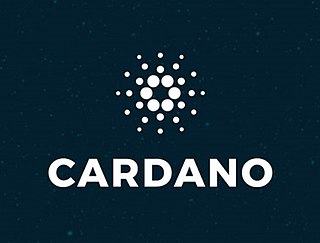
A certificate of authenticity (COA) is a seal or small sticker on a proprietary computer program, t-shirt, jersey, or any other memorabilia or art work, especially in the world of computers and sports. It is commonly a seal on paper authenticating a specific art work which and is made to demonstrate that the item is authentic.
Animoca Brands Corporation Ltd. is a Hong Kong-based game software company and venture capital company co-founded in 2014 by Yat Siu and David Kim. The company initially focused on developing mobile games, then shifted to blockchain gaming and NFTs in 2018.

Ethereum is a decentralized blockchain with smart contract functionality. Ether is the native cryptocurrency of the platform. Among cryptocurrencies, ether is second only to bitcoin in market capitalization. It is open-source software.
A decentralized autonomous organization (DAO), sometimes called a decentralized autonomous corporation (DAC), is an organization managed in whole or in part by decentralized computer program, with voting and finances handled through a blockchain. In general terms, DAOs are member-owned communities without centralized leadership. The precise legal status of this type of business organization is unclear.
A decentralised application is an application that can operate autonomously, typically through the use of smart contracts, that run on a decentralized computing, blockchain or other distributed ledger system. Like traditional applications, DApps provide some function or utility to its users. However, unlike traditional applications, DApps operate without human intervention and are not owned by any one entity, rather DApps distribute tokens that represent ownership. These tokens are distributed according to a programmed algorithm to the users of the system, diluting ownership and control of the DApp. Without any one entity controlling the system, the application is therefore decentralised.

Cardano is a public blockchain platform. It is open-source and decentralized, with consensus achieved using proof of stake. It can facilitate peer-to-peer transactions with its internal cryptocurrency, ADA.
Video games can include elements that use blockchain technologies, including cryptocurrencies and non-fungible tokens (NFTs), often as a form of monetization. These elements typically allow players to trade in-game items for cryptocurrency, or represent in-game items with NFTs. A subset of these games are also known as play-to-earn games because they include systems that allow players to earn cryptocurrency through gameplay. Blockchain games have existed since 2017, gaining wider attention from the video game industry in 2021. Several AAA publishers have expressed intent to include this technology in the future. Players, developers, and game companies have criticized the use of blockchain technology in video games for being exploitative, environmentally unsustainable, and unnecessary.

A non-fungible token (NFT) is a unique digital identifier that is recorded on a blockchain and is used to certify ownership and authenticity. It cannot be copied, substituted, or subdivided. The ownership of an NFT is recorded in the blockchain and can be transferred by the owner, allowing NFTs to be sold and traded. NFTs can be created by anybody and require few or no coding skills to create. NFTs typically contain references to digital files such as artworks, photos, videos, and audio. Because NFTs are uniquely identifiable, they differ from cryptocurrencies, which are fungible.
Sorare is a fantasy sport cryptocurrency-based video game. It was developed in 2018 by Nicolas Julia and Adrien Montfort. There are 3 sports in Sorare: football, basketball, and baseball. It is available for Android, iOS and web browsers.

CryptoPunks is a non-fungible token (NFT) collection on the Ethereum blockchain. The project was launched in June 2017 by the Larva Labs studio, a two-person team consisting of Canadian software developers Matt Hall and John Watkinson. The experimental project was inspired by the London punk scenes, the cyberpunk movement, and electronic music artists Daft Punk. The crypto art blockchain project was an inspiration for the ERC-721 standard for NFTs and the modern crypto art movement, which has since become a part of the cryptocurrency and decentralized finance ecosystems on multiple blockchains.
Stacks, formerly Blockstack, is a blockchain platform for smart contracts, decentralized finance ("DeFi"), non-fungible tokens (NFTs), and decentralized apps ("DApps"). Stacks blockchain is a layer for bitcoin similar to the Lightning Network.

Axie Infinity is a blockchain game developed by Vietnamese studio Sky Mavis, known for its in-game economy which uses Ethereum-based cryptocurrencies.
A rare Pepe or RarePepe is a variation on the "Pepe the Frog" internet meme, itself based on a character created by Matt Furie. The related Rare Pepe crypto project, created by various artists worldwide between 2016 and 2018, was based on the aforementioned meme and traded as non-fungible tokens (NFTs) recorded on the CounterParty platform. A total of 1,774 official cards were released for the project across 36 series.

Doctor Who: Worlds Apart is a free-to-play digital collectible card game using a blockchain on a fork of Ethereum developed and published by Reality Gaming Group, based upon the BBC television series Doctor Who. The game has released for Microsoft Windows and macOS, and is planned to be released for mobile devices soon.
OpenSea is an American non-fungible token (NFT) marketplace headquartered in New York City. The company was founded by Devin Finzer and Alex Atallah in 2017.
Curio Cards are collectible digital artworks located on the Ethereum blockchain. Created in 2017, Curio Cards are commonly viewed as the first digital art collectibles on the Ethereum blockchain. In October 2021, a complete collection of Curio Cards, including the card "17b" misprint, was sold for ETH393 ($1,267,320) at the Christie's Post-War to Present auction. The collection was tested for security vulnerabilities in September 2021 by softstack.

Polygon is a blockchain platform which aims to create a multi-chain blockchain system compatible with Ethereum. As with Ethereum, it uses a proof-of-stake consensus mechanism for processing transactions on-chain. Polygon's native token is named MATIC. Matic is an ERC-20 token, allowing for compatibility with other Ethereum cryptocurrencies. It is operated by Polygon Labs.

The ERC-721 Non-fungible Token Standard, is a technical framework, defining a set of rules and interfaces for creating and managing unique, non-fungible tokens (NFTs) on the Ethereum blockchain. ERC-721 is recognized for formalizing the concept of an NFT and establishing the foundation of the multi-billion dollar digital collectibles eco-system that emerged alongside its adoption. It is one of the most widely used NFT standards across use cases and has been utilized in various high profile projects.
William "Will" Entriken, also known by the online moniker Fulldecent, is a solutions architect, cybersecurity specialist, financial analyst, general manager, and civic hacker best known for his contributions in blockchain technology and open sourced solutions. He is recognized as the lead author of the landmark Ethereum paper ERC-721: Non-Fungible Token Standard, published in 2018. This paper is recognized for pioneering the foundation of the digital collectibles eco-system by establishing a programming standard called "ERC-721" to create NFTs via smart contracts on Ethereum. It also first formalized and defined the term Non-Fungible Token (NFT) into blockchain nomenclature which was made popular by the blockchain game CryptoKitties; the CTO of that game, Dieter Shirley, is also a fellow co-author of the published paper.









